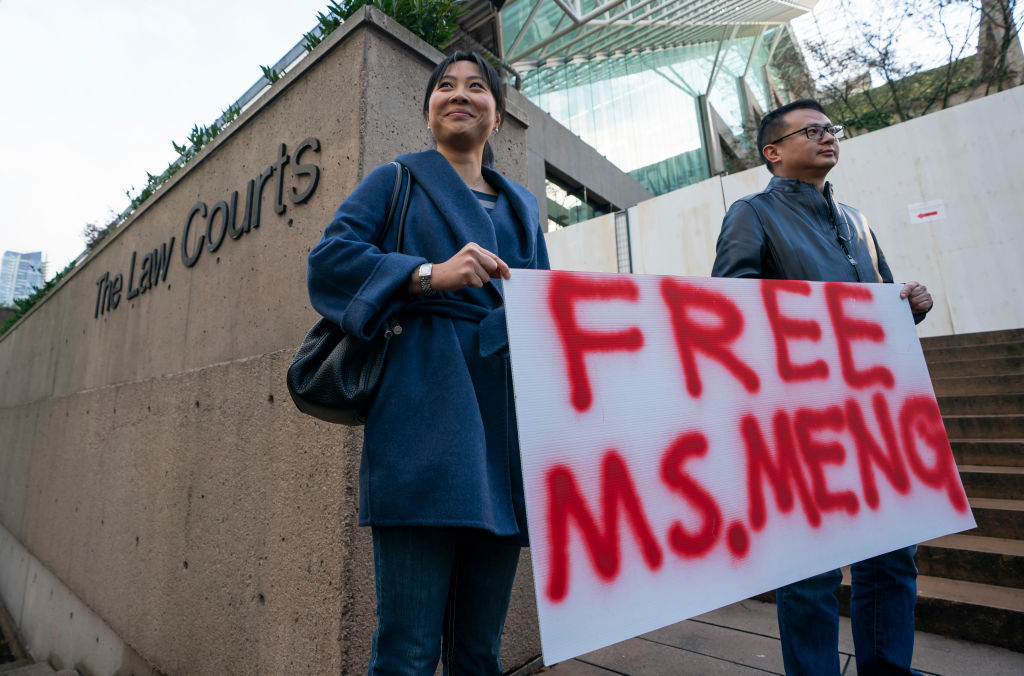The U.S. and Canada insist the arrest of a Chinese executive is a purely legal matter. Trump just made it political.


A free daily email with the biggest news stories of the day – and the best features from TheWeek.com
You are now subscribed
Your newsletter sign-up was successful
Canada's Dec. 1 arrest of Meng Wanzhou, the chief financial officer of Chinese telecom giant Huawei, on a U.S. warrant has roiled U.S.-China trade negotiations and Chinese-Canadian relations. The dicey situation got even more complicated on Tuesday, when Canada confirmed that Chinese security agents arrested former Canadian diplomat Michael Kovrig for unspecified reasons and President Trump said he would consider intervening in the Meng case, politicizing what U.S. and Canadian officials have insisted is purely a legal affair. A judge in Vancouver also agreed to release Meng on $7.5 million bail.
The U.S. accuses Meng, the 46-year-old daughter of Huawei's founder, of conspiracy to defraud banks about the company's alleged violations of Iran sanctions. If she is extradited to the U.S. and convicted, Meng faces decades in jail. When Reuters asked Trump on Tuesday if he would intervene in the Meng case, he said he might.
"Whatever's good for this country, I would do," he said. "If I think it's good for the country, if I think it's good for what will be certainly the largest trade deal ever made — which is a very important thing — what's good for national security, I would certainly intervene if I thought it was necessary." It's possible Meng could be released, he added. "It's also possible it will be a part of negotiations. But we'll speak to the Justice Department, we'll speak to them, we'll get a lot of people involved."
The Week
Escape your echo chamber. Get the facts behind the news, plus analysis from multiple perspectives.

Sign up for The Week's Free Newsletters
From our morning news briefing to a weekly Good News Newsletter, get the best of The Week delivered directly to your inbox.
From our morning news briefing to a weekly Good News Newsletter, get the best of The Week delivered directly to your inbox.
"The U.S. and China have tried to keep Meng's case separate from their wider trade dispute," The Associated Press reports. "Trump undercut that message." Also, "an intervention by Trump would seem to confirm China's suspicion that this is not a legal proceeding but a political negotiation," The Washington Post adds, "potentially changing the terms of the conflict."
A free daily email with the biggest news stories of the day – and the best features from TheWeek.com
Peter has worked as a news and culture writer and editor at The Week since the site's launch in 2008. He covers politics, world affairs, religion and cultural currents. His journalism career began as a copy editor at a financial newswire and has included editorial positions at The New York Times Magazine, Facts on File, and Oregon State University.
-
 Are AI bots conspiring against us?
Are AI bots conspiring against us?Talking Point Moltbook, the AI social network where humans are banned, may be the tip of the iceberg
-
 5 calamitous cartoons about the Washington Post layoffs
5 calamitous cartoons about the Washington Post layoffsCartoons Artists take on a new chapter in journalism, democracy in darkness, and more
-
 Political cartoons for February 14
Political cartoons for February 14Cartoons Saturday's political cartoons include a Valentine's grift, Hillary on the hook, and more
-
 TikTok secures deal to remain in US
TikTok secures deal to remain in USSpeed Read ByteDance will form a US version of the popular video-sharing platform
-
 Unemployment rate ticks up amid fall job losses
Unemployment rate ticks up amid fall job lossesSpeed Read Data released by the Commerce Department indicates ‘one of the weakest American labor markets in years’
-
 US mints final penny after 232-year run
US mints final penny after 232-year runSpeed Read Production of the one-cent coin has ended
-
 Warner Bros. explores sale amid Paramount bids
Warner Bros. explores sale amid Paramount bidsSpeed Read The media giant, home to HBO and DC Studios, has received interest from multiple buying parties
-
 Gold tops $4K per ounce, signaling financial unease
Gold tops $4K per ounce, signaling financial uneaseSpeed Read Investors are worried about President Donald Trump’s trade war
-
 Electronic Arts to go private in record $55B deal
Electronic Arts to go private in record $55B dealspeed read The video game giant is behind ‘The Sims’ and ‘Madden NFL’
-
 New York court tosses Trump's $500M fraud fine
New York court tosses Trump's $500M fraud fineSpeed Read A divided appeals court threw out a hefty penalty against President Trump for fraudulently inflating his wealth
-
 Trump said to seek government stake in Intel
Trump said to seek government stake in IntelSpeed Read The president and Intel CEO Lip-Bu Tan reportedly discussed the proposal at a recent meeting
